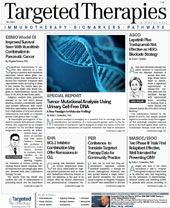Conference to Translate Targeted Therapy Data for Community Practice
In 2001, the FDA approved Gleevec (imatinib mesylate), a therapy for CML that was quickly labeled a magic bullet, and shortly thereafter, the International Congress on Targeted Therapies in Cancer® was assembled to discuss what these types of therapies would mean for the cancer treatment of the future.
Alex A. Adjei, MD, PhD, FACP
In 2001, the US Food and Drug Administration approved Gleevec (imatinib mesylate),1a therapy for chronic myelogenous leukemia that was quickly labeled a magic bullet,2and shortly thereafter, the International Congress on Targeted Therapies in Cancer® was assembled to discuss what these types of therapies would mean for the cancer treatment of the future.
The future is now: currently, The Cancer Genome Atlas project performs characterization and sequence analysis on over 20 different tumor types, analyzing samples to identify and catalogue a plethora of mutational targets for treatment.3This month, a comprehensive genomic analysis from the project, published in Nature, identified several key mutations in the adenocarcinoma histology of lung cancer.4Because of research efforts such as this, targeted therapies, both approved and in trials, are abundant, but most treatments are not as simple as a single magic bullet. Today’s treatments often involve a complex recipe of combination regimens that are highly specific to a patient’s genomic subtype.
Alex A. Adjei, MD, PhD, FACP, senior director for the 12th Annual International Congress on Targeted Therapies in Cancer®, which will be held October 11-12, 2014 at the Westin New York at Times Square, believes that it is important to examine how this wealth of cutting-edge data on current and emerging anticancer therapies may be utilized in practice in order to increase positive outcomes for patients and, he states, this year’s Congress will provide that information.
“We have changed the meeting format considerably. In the past, the meeting focused on the targeted agents, themselves. Now we are breaking them into disease sections. So a physician can come to a session to know about new agents in GI cancers, lung cancer, prostate, hematological malignancies, and so on. It is going to be more user-friendly from that perspective,” Adjei said.
12th Annual International Congress on Targeted Therapies in Cancer®: List of Faculty and Program Directors
Program Directors
Alex A. Adjei, MD, PhD, FACP Senior Vice President of Clinical Research Professor and Chair, Department of Medicine The Katherine Anne Gioia Chair in Cancer Medicine Roswell Park Cancer Institute Buffalo, NY
John Wright, MD, PhD Associate Branch Chief Investigational Drug Branch National Cancer Institute Bethesda, MD
Faculty
Howard A. “Skip” Burris III, MD, FACP
Ajai Chari, MD
Myron S. Czuczman, MD
Robert Dreicer, MD, MS, FACP
S. Gail Eckhardt, MD
Saby George, MD, FACP
Matthew P. Goetz, MD
Roy S. Herbst, MD, PhD
Renuka Iyer, MD
Mark G. Kris, MD
Razelle Kurzrock, MD
Cynthia X. Ma, MD, PhD
John L. Marshall, MD
Daniel Petrylak, MD
Roberto Pili, MD
Hope S. Rugo, MD
Manish A. Shah, MD
Alice Shaw, MD, PhD
Meir Wetzler, MD, FACP
During the Congress, medical oncologists and researchers will have the opportunity to learn from and interact with international leaders in clinical research (see List) and have active discussions regarding how the targeted agents of today and those being studied for the next generation of cancer therapy may be best used within their institutions and practices.
Topics to be discussed during the Saturday, October 11 session include the HER Family of Receptor Tyrosine Kinases; PD-1/PD-L1; ALK; Antibody- Drug Conjugates, PI3K/mTOR; HER2; Targeted Therapies in Hematologic Malignancies; Novel Targets in Multiple Myeloma; Chronic and Acute Leukemias; and Lymphoma Targets. Topics that will be covered at the session on Sunday, October 12, include Targeted Therapies in Genitourinary Cancers; Anti-Androgen Therapies; Nonhormonal Agents; Immunotherapies; Targeted Therapies in Gastrointestinal Cancers; Targeting Esophageal and Stomach Cancers; Pancreatic Cancers; and HCC and Colorectal Cancer Targets.
For more information and to register for the Congress, go tohttp://www.gotoper.com/conferences/itt/meetings/12th-International-Congress-on-Targeted-Therapies-in-Cancer.
References
- National Cancer Institute at the National Institutes of Health. FDA approves important new leukemia drug. http://www.cancer .gov/newscenter/newsfromnci/2001/ gleevecpressrelease. Accessed July 11, 2014.
- Henderson CA Jr. Imatinib: the promise of a “magic bullet” for cancer fulfilled. J Med Assoc Ga. 2003;92(1):12-14,22.
- The Cancer Genome Atlas. About TCGA. http://cancergenome.nih.gov/abouttcga. Accessed July 11, 2014.
- The Cancer Genome Atlas. Study identifies novel genomic changes in the most common type of lung cancer [news release]. http:// cancergenome.nih.gov/newsevents/ newsannouncements/TCGA_LUAD_press_ release_2014. Accessed July 11, 2014.
Advances in Subsequent Therapies Shake Up Sequencing of ccRCC Treatment
April 25th 2024With the approval of belzutifan and other newer data for treating patients with recurrent renal cell carcinoma, the state of subsequent therapies is advancing beyond the reuse of frontline options with impacts on duration of response and quality of life.
Read More
Novel Approaches Focus on Limiting Toxicity in Older Patients With ALL
April 22nd 2024The major challenges for clinicians treating older patients with acute lymphoblastic leukemia surround the emergence of resistance to existing therapies and the toxicities associated with current chemotherapies.
Read More
Ornstein Advises on Starting Dose and Management of Lenvatinib in RCC
April 21st 2024During a Case-Based Roundtable® event, Moshe Ornstein, MD, MA, provided guidance on dosing and toxicity concerns in a patient treated with lenvatinib plus pembrolizumab for advanced renal cell carcinoma.
Read More
